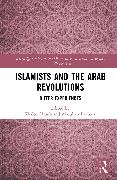Read more
This monograph offers the most comprehensive and regionally grounded analysis to date of how Islamist movements across the Middle East responded to - and were transformed by - the 2010-2011 Arab uprisings.
List of contents
Table of ContentsAcknowledgementsContributors1.
Introduction - Islamists and the Arab revolutions: Diverse experiences and bitter lessons
Khaled Hroub and Abdullah Baabood
2.
Egypt - Walk in place: Political and ideological revisionism within Egypt's post-2013 Muslim Brotherhood
Mohammad Affan and Heba Raouf Ezzat
3.
Egypt - The lure of politics: Transformations of Egypt's Salafists during and after the 2011 Revolution
Khalil al-Anani
4.
Tunisia - The Tunisian Ennahda Movement after the 2020 Revolution: Failure and Uncertainty.
Salah Eddin Jourchi
5.
Yemen -
Ateq Jarallah
6.
Morocco - Was there a 'Moroccan Spring' for Justice and Development Party?
Abdelali Hamidine
7.
Oman - Islamists and the Omani Spring
Said Sultan Al Hashimi
8.
Libya - Libyan Islamists during and after the Arab Spring
Osama Kubbar
9.
Jordan - The "Brotherhood" in Jordan after the Arab Spring: Political, intellectual and organizational crises and transformations
Mohammad Abu Rumman
10.
Bahrain and Kuwait - Gulf Islamist movement during the Arab Spring: A critique of the experience
Baqer Alnajjar
11.
Syria - Incomplete transformations: Islamists and the challenge of revolution and rule in Syria, 2011-2022
Abdulrahman Alhaj
12.
Sudan - Sudanese Islamists: From freedom seekers to authoritarian rulers
Khalid Eltigani Elnour
About the author
Khaled Hroub is a professor at Northwestern University in Qatar and a former fellow at the University of Cambridge. He researches Arab media and politics, especially in Palestine and the Middle East. He has authored several books including on Hamas and religious broadcasting, and holds a Ph.D. in international relations from Cambridge.
Abdullah Baabood is the Qatar Chair for Islamic Area Studies and visiting professor at Waseda University. He has held key roles at Qatar University and the University of Cambridge, focusing on Gulf politics, economics, and foreign relations. He holds a Ph.D. in international relations from Cambridge and an MBA from Kent University.

